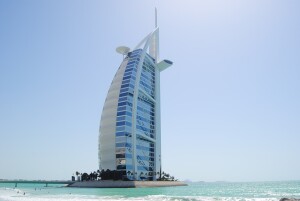| The Authors
Charles Laubach Partner claubach@afridi-angell.com Tel: +971 4 330 3900 Charles is a partner at Afridi & Angell’s Dubai office. He has practiced as a legal consultant in the UAE since 1986. He advises on general corporate matters, military procurement and offsets, project finance, employment, and international trade controls. Charles is a member of the Pennsylvania and DC Bars. He holds a JD and an MA from the University of Pennsylvania, an MA from the University of London School of Oriental and African Studies, and a BA from Dartmouth College.
Saurbh Kothari Senior Associate saurbh@afridi-angell.com Tel: +971 4 330 3900 Saurbh joined Afridi & Angell in 2008 and is a senior associate in the corporate and commercial team. He advises both local and international clients on a broad range of corporate/commercial and employment matters. Saurbh is a member of the Bar Council of Rajasthan, India. He holds an LLM from the University of California, Berkeley and a BBA LLB from National Law University, Jodhpur, India. |
By Charles Laubach and Saurbh Kothari
As reported in our inBrief of 15 April 2020, Federal Decree-Law 19 of 2018 on Foreign Direct Investment (the FDI Law) permits majority foreign investment in certain business sectors and activities. Although majority ownership is attractive, it is not the only factor that a potential foreign direct investor should consider. One additional factor is whether the proposed business would qualify for the 5% GCC customs duty exemption that is discussed below. Customs-exempt access to the larger GCC market could be a critical factor to the success of a business.
FDI Law
Any company incorporated under the FDI Law is subject to the restriction stated in Article 8(1) of the FDI Law.
Article 8(1) of the FDI Law states as follows:
Article 8 – Benefits offered to Foreign Direct Investment Projects
- Foreign Direct Investment companies licensed hereunder shall be subject to the law on the treatment of national companies within the limits prescribed by the legislation in force in the United Arab Emirates and the international agreements to which the United Arab Emirates is party.
The legislation in force in the UAE and the international agreements to which the UAE is party would include the measures taken by the UAE pursuant to the GCC Economic Agreement and the GCC Common Customs Law. The GCC, formally known as the Cooperation Council of the Arab States of the Gulf, includes as members Bahrain, Kuwait, Oman, Qatar, Saudi Arabia, and the United Arab Emirates.
Unified Economic Agreement 1981
Since the formation of the GCC in 1981, national treatment for goods produced in a GCC member state has been accorded by the other GCC member states only if certain ownership and value- added criteria are satisfied. Specifically, Article 3 of the Unified Economic Agreement 1981 states as follows:
- For products of national origin to qualify as national manufactured products, the value-added ensuing from their production in Member States shall not be less than 40% of their final value as at the termination of the production phase. In addition, Member States citizens’ share in the ownership of the producing plant shall not be less than 51%.
- Every item enjoying exemption hereby shall be accompanied by a certificate of origin duly authenticated by the appropriate government agency concerned.
(emphasis added)
This requirement that GCC citizens own no less than 51% of the manufacturing facility in question remains in effect today. Therefore, exports of a company formed under the FDI Law with non-GCC ownership in excess of 49% would not be eligible for national treatment when exported to another GCC member state.
Economic Agreement 2001
Although the Unified Economic Agreement 1981 was replaced by the Economic Agreement 2001, the national ownership requirement stated above was kept in effect. Article 1 of the Economic Agreement 2001 states as follows:
Article 1 – The Customs Union
Trade between the GCC member States will be conducted within the framework of a customs union that will be implemented no later than the first of January 2003. It shall include, at a minimum, the following: … 5. Goods produced in any Member State shall be accorded the same treatment as national products.
(emphasis added)
However, the Economic Agreement 2001 preserved the earlier GCC ownership and value-added criteria. Specifically, Article 32 of the Economic Agreement 2001 stated as follows:
Article 32 – Precedence of the provisions of the Agreement
- The provisions of this Agreement shall prevail if found in disagreement with local laws and regulations of the Member
- This Agreement shall supersede the GCC Economic Agreement signed in 1981 AD (1402 AH), and the provisions contained herein shall supersede equivalent provisions set forth in bilateral agreements (between member states).
- Until the GCC Customs Union is established, the provisions of Article 3 of the GCC Economic Agreement signed in 1981 AD (1402 AH) shall continue to be applied. The percentage of the added value provided for in said Article may be amended by a decision of the Financial and Economic Committee.
(emphasis added)
Common Customs Law of the GCC States
The foregoing requirements were not changed with the introduction of the GCC Customs Union, agreed in 2007 and implemented in the UAE pursuant to Federal Decree 85 of 2007 (the Common Customs Law). Article 9 of the Common Customs Law states as follows:
Goods entering the country shall be subject to the customs tax by virtue of the unified customs tariff and the determined fees, except for those exempted by virtue of the present law or under the Unified Economic Agreement among the countries of the Gulf Cooperation Council (GCC) or any other international agreement within the framework of the Council.
(emphasis added)
Thus, the Common Customs Law referred to the Economic Agreement 2001, which in turn referred to Article 3 of the Unified Economic Agreement 1981, which contained the familiar GCC ownership and value-added criteria.
Accordingly, formation of a company in the UAE under the FDI Law is not sufficient to grant the exports of that company Customs-free access to the rest of the GCC. Instead, the GCC ownership requirement stated in Article 3 of the Unified Economic Agreement 1981, meaning that products of a 100% foreign owned company would be ineligible for exemption of the 5% customs duty when shipped to other GCC member states. ■
| Afridi & Angell
Founded in 1975, Afridi & Angell is a full-service UAE law firm in its fifth decade at the forefront of the legal community. From the beginning, our hallmarks have been a commitment to quality, unsurpassed knowledge of the law and the legal environment, and crafting of innovative business solutions. Licensed in the three largest Emirates of Abu Dhabi, Dubai and Sharjah as well as the Dubai International Financial Centre, our practice areas include banking and finance; corporate and commercial law; arbitration and litigation; construction; real estate; infrastructure projects; energy; project finance; maritime (wet and dry); and employment. We advise local, regional and global clients ranging in size and sophistication from start-ups, sole proprietorships, family-owned businesses, entrepreneurs and investors to some of the world’s largest public and private companies, governments and quasi- government institutions. We attract and retain clients with our dedication to practical guidance focused on their business needs supported by decades of experience here in our home jurisdiction, the UAE. Afridi & Angell is the exclusive member firm in the UAE of top legal networks and associations, most notably Lex Mundi, the world’s leading network of independent law firms, and World Services Group. |
| Afridi & Angell’s inBrief provides a brief overview and commentary on recent legal announcements and developments. Comments and opinions contained herein are general information only. They should not be regarded or relied upon as legal advice.
© 2020, Afridi & Angell |




